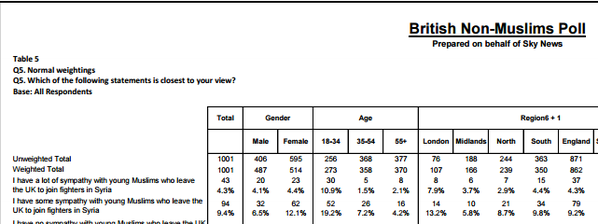The Sun ran an "exclusive" poll on its front page on Monday that it claimed showed 1 in 5 British Muslims had voiced "sympathy for jihadis" fighting in Syria.
SUN FRONT PAGE: '1 in 5 Brit Muslims' sympathy for jihadis' #skypapers
The poll, carried out by the market research firm Survation, was conducted via telephone interviews of 1,003 people who identified themselves as Muslims living in the UK.
Fourteen per cent of respondents said they had "some sympathy" for individuals who had gone to fight with militia groups in Syria, while 5% said they had "a lot of sympathy" for them.
However, some people have questioned whether the paper's reporting accurately reflects the survey question as it was asked.
There's nothing measured I can tweet that does justice to how the Sun front page has made me feel this Monday morning. Have a good week all.
The Sun front page story is polling at its worst: bad qs designed to deliver misleading result to fit pre-existing fearmongering narrative
Others have even warned that it could be dangerous and lead to further religious hatred in the wake of the Paris terrorist attacks.
Another grotesque front page from The Sun inciting racial & religious hatred. Dangerous & nothing less than shameful https://t.co/rt04V0h9xK
Pollsters including election analyst Mike Smithson pointed out that the proportion of Muslims who showed "a lot of sympathy" for those fighting in Syria and Iraq in the poll was much smaller.
Sun front page polling. So just one UK Muslim in 20 has a lot of sympathy for those who go to Syria to join fighters
Additionally, around 14% of non-Muslims expressed sympathy for people fighting in Syria and Iraq in a poll commissioned by Sky News in March this year.

Others, including Faith Matters researcher Steve Rose, pointed out that the poll does not ask which groups respondents supported or their reasonings why.
Front page vs the actual question
Because of this, it may be the case that researchers conducting the poll could have also counted individuals who support "non-jihadi" groups such as the Kurdish YPG or those fighting with the Free Syrian Army.
Additionally, the research states that pollsters did not specifically ask whether individuals supported specific jihadi groups, such as ISIS or Jahbat al-Nusra.
This is not the first time that there has been criticism over polls charting the behaviour of British Muslim communities and their attitudes to ISIS.
Manchester University researcher Dr Maria Sobolewska has noted that it is unlikely polls can "meaningfully estimate numbers of terrorist or future terrorists among British Muslims" and said the opinions of most British Muslims on issues to do with extremism generally show similar patterns to non-Muslims living the UK.
"It is truly scary to think that our counter-terrorism policy may rely on these polls and similar questions in other surveys (like the Citizenship Survey) in their estimations of likely terrorists," she wrote in a blog post last year.
